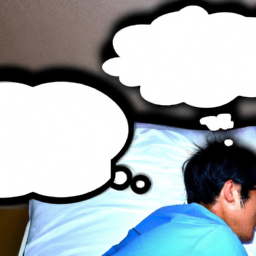Approximately 80% of adults at some point in their lives experience vivid dreams. And if you’re one of those, you know just how disruptive these intense dreams can be to your sleep, leaving you feeling exhausted the following day.
The good news is that there are steps you can take to put an end to these vivid dreams and improve the quality of your sleep. In this article, I will guide you through evidence-based strategies to help you stop vivid dreams and achieve a more restful night’s sleep.
From understanding the causes of vivid dreams to creating a relaxing bedtime routine, managing stress and anxiety, and trying natural remedies and supplements, I will provide you with practical tips that you can implement starting tonight.
So, if you’re ready to say goodbye to those disruptive dreams and wake up feeling refreshed, let’s get started!
Key Takeaways
- Understanding the causes of vivid dreams is crucial in finding a solution
- Practicing relaxation techniques like deep breathing, meditation, and yoga can help manage stress and promote better sleep
- Keeping a dream journal can provide insight into the triggers and patterns of vivid dreams, allowing for lifestyle changes to reduce their occurrence
- Seeking professional help from healthcare providers or sleep specialists may be necessary if vivid dreams persist or significantly impact daily life
Understand the Causes of Vivid Dreams
Imagine drifting off to sleep, only to find yourself transported to a world where your wildest dreams come to life. Vivid dreams can be fascinating and even entertaining, but they can also be disruptive and leave you feeling tired and unrested in the morning. Understanding the causes of vivid dreams is the first step towards finding a solution.
One possible cause of vivid dreams is the symbolism they hold. Dreams often act as our subconscious mind’s way of processing emotions and experiences. By understanding the symbols within our dreams, we can gain insight into our own psyche and potentially address any underlying issues that may be contributing to their intensity.
Another technique to explore is lucid dreaming. Lucid dreaming is when you become aware that you are dreaming while still in the dream itself. By practicing lucid dreaming techniques, such as reality testing and keeping a dream journal, you can gain control over your dreams and potentially reduce their vividness.
Maintaining a consistent sleep schedule is crucial in managing vivid dreams. By going to bed and waking up at the same time every day, you can regulate your sleep patterns and potentially reduce the occurrence of intense dreams. Additionally, creating a relaxing bedtime routine and creating a sleep-friendly environment can further promote restful sleep.
Understanding the causes of vivid dreams and exploring techniques like dream symbolism and lucid dreaming can help you gain control over your dream experiences. Maintaining a consistent sleep schedule is the next step towards achieving a restful night’s sleep.
Maintain a Consistent Sleep Schedule
To achieve a peaceful night’s sleep, try sticking to a regular sleep routine, allowing your body to settle into a comforting rhythm that banishes any disruptions to your slumber. Maintaining a consistent sleep schedule is an effective way to improve sleep quality and reduce the occurrence of vivid dreams. When you go to bed and wake up at the same time every day, your body becomes accustomed to this routine, signaling to your brain that it is time to rest. This consistency helps regulate your internal body clock, also known as the circadian rhythm, which plays a crucial role in promoting healthy sleep patterns.
Creating a regular sleep schedule involves going to bed and waking up at the same time, even on weekends. To further enhance the effectiveness of this routine, it can be helpful to establish a bedtime routine that signals to your body and mind that it is time to wind down and prepare for sleep. This routine may include activities such as reading a book, taking a warm bath, or practicing relaxation techniques. By incorporating these strategies into your nightly routine, you can create a relaxing bedtime routine that promotes restful sleep and reduces the likelihood of experiencing vivid dreams.
Create a Relaxing Bedtime Routine
Craft a soothing bedtime routine that will transport you to a peaceful oasis, allowing your mind and body to unwind and drift off to a tranquil slumber. Developing sleep rituals and creating a peaceful sleep environment can greatly enhance the quality of your sleep and reduce the occurrence of vivid dreams.
Here are three items to include in your bedtime routine:
-
Create a Calming Atmosphere: Dim the lights, play soft music, or use a white noise machine to create a relaxing ambiance in your bedroom. Consider using essential oils like lavender, chamomile, or valerian, which’re known for their calming properties.
-
Disconnect from Electronics: As bedtime approaches, disconnect from electronic devices such as smartphones, tablets, and computers. The blue light emitted by these devices can interfere with your sleep patterns and increase the likelihood of vivid dreams. Instead, engage in activities that promote relaxation, such as reading a book or taking a warm bath.
-
Practice Relaxation Techniques: Incorporate relaxation techniques into your bedtime routine, such as deep breathing exercises, progressive muscle relaxation, or meditation. These techniques can help calm your mind and prepare your body for a restful night’s sleep.
By incorporating these practices into your bedtime routine, you can create a peaceful sleep environment that promotes relaxation and reduces the occurrence of vivid dreams. Transitioning to the next section, it’s also important to avoid stimulants and heavy meals before bed.
Avoid Stimulants and Heavy Meals Before Bed
Transform your bedtime routine by avoiding stimulants and heavy meals before bed, allowing your body to naturally unwind and prepare for a restful night’s sleep. When it comes to preventing vivid dreams, what you consume before bedtime plays a crucial role.
Stimulants such as caffeine can interfere with your sleep patterns, making it difficult for your brain to enter the deep sleep phase where dreams occur. Therefore, it’s important to avoid caffeine-containing beverages like coffee, tea, and energy drinks in the hours leading up to bedtime. Additionally, it’s advisable to limit alcohol intake, as it may disrupt your sleep cycles and increase the likelihood of experiencing vivid dreams.
Heavy meals before bed can also contribute to vivid dreams. Consuming large amounts of food before sleep can cause indigestion and discomfort, making it harder for your body to relax and enter a restful state. Instead, opt for lighter, well-balanced meals in the evening to promote better sleep quality.
Additionally, consider incorporating relaxation techniques into your bedtime routine, such as deep breathing exercises or gentle stretching, to further aid in preparing your body for sleep.
By avoiding stimulants and heavy meals before bed, you can create an optimal sleep environment that reduces the likelihood of experiencing vivid dreams. Managing stress and anxiety will be the next step in improving your sleep quality and preventing disruptive dreams.
Manage Stress and Anxiety
Managing stress and anxiety can create a peaceful and calm mindset that promotes a restful night’s sleep. When we’re stressed or anxious, our minds can be filled with racing thoughts and worries, making it difficult to relax and fall asleep. However, there are effective techniques that can help us manage stress and anxiety, leading to better sleep quality.
One technique to try is deep breathing exercises. Deep breathing slows down our heart rate and activates the relaxation response in our body, helping us feel more calm and centered.
Another helpful practice is incorporating yoga and stretching techniques into our daily routine. Yoga can help release tension in our muscles and promote relaxation, while stretching can help relieve physical and mental stress.
Incorporating these techniques into our daily routine can have a significant impact on our sleep quality. By managing our stress and anxiety, we can create a peaceful and calm mindset that promotes a restful night’s sleep. Practicing mindfulness and meditation can further enhance these effects, leading to even better sleep.
Practice Mindfulness and Meditation
To effectively manage stress and anxiety, it’s important to explore various techniques that can help calm the mind and promote relaxation.
One technique that has gained significant attention in recent years is mindfulness and meditation.
Mindfulness involves being fully present in the moment, paying attention to thoughts, feelings, and bodily sensations without judgment. It allows us to observe our experiences without getting caught up in them, creating a sense of mental clarity and emotional stability.
Meditation, on the other hand, is a practice that involves focusing the mind and eliminating the stream of thoughts that often lead to stress and anxiety. It can be as simple as sitting quietly and focusing on the breath or using guided meditation apps.
Research has shown that incorporating mindfulness techniques and meditation into our daily routine can have numerous benefits for our mental well-being. Regular practice can reduce stress, anxiety, and depression symptoms, improve attention and concentration, enhance self-awareness, and promote a sense of overall peace and happiness.
By engaging in mindfulness and meditation practices, we can develop a better understanding of our thoughts and emotions, allowing us to detach from them and prevent them from influencing our dreams.
This brings us to the next technique: keeping a dream journal.
Keep a Dream Journal
Start by grabbing a notebook and pen, and begin recording your dreams each morning upon waking up. Keeping a dream journal can help you gain insight into the causes of your vivid dreams and identify any patterns or triggers. By writing down your dreams, you create a record that allows you to reflect on the emotions, themes, and experiences you encounter during sleep.
Here is an example of how you can structure your dream journal:
| Date | Dream Description |
|---|---|
| 01/15/2022 | Flying through the sky, feeling freedom and exhilaration |
| 01/16/2022 | Being chased by a mysterious figure |
| 01/17/2022 | Attending a party with friends |
| 01/18/2022 | Swimming in an ocean of colorful fish |
Analyzing your dream journal may reveal common factors that contribute to your vivid dreams. For instance, you may notice that certain activities, foods, or emotions precede these dreams. By identifying potential triggers, you can make informed lifestyle changes to reduce their occurrence.
Transitioning into the next section about trying natural remedies and supplements, it is important to explore additional methods to manage vivid dreams.
Try Natural Remedies and Supplements
Using natural remedies and supplements can transport me to a peaceful dreamland filled with tranquility and serenity. When it comes to managing vivid dreams, herbal remedies and lifestyle changes can be effective tools.
One popular herbal remedy is valerian root, which has been used for centuries to promote relaxation and sleep. It can help reduce the intensity of dreams and promote a more restful sleep.
Another option is chamomile tea, known for its calming properties. Sipping a warm cup before bed can help me relax and potentially decrease the vividness of my dreams.
In addition to herbal remedies, making certain lifestyle changes can also make a difference. Avoiding caffeine and alcohol close to bedtime can help regulate sleep patterns and reduce the likelihood of vivid dreams. Creating a relaxing bedtime routine, such as taking a warm bath or practicing relaxation techniques, can signal to my body that it’s time to wind down and prepare for sleep.
While natural remedies and lifestyle changes can be helpful, it’s important to remember that everyone is different. If vivid dreams persist or significantly impact my daily life, it may be necessary to seek professional help. A healthcare provider or sleep specialist can offer personalized advice and guidance to address the issue effectively.
Seek Professional Help if Necessary
If the intensity and frequency of your dreams are significantly impacting your daily life, it may be time to consult a healthcare provider or sleep specialist. Studies have shown that seeking professional help can lead to a 60% reduction in dream-related distress.
A healthcare provider or sleep specialist can provide you with professional advice and guidance on managing your vivid dreams. They can evaluate your sleep patterns, medical history, and any underlying conditions that may be contributing to your dreams. They may recommend therapy options such as cognitive behavioral therapy for insomnia (CBT-I) or imagery rehearsal therapy (IRT) to help reduce the intensity and frequency of your dreams.
Cognitive behavioral therapy for insomnia (CBT-I) is a type of therapy that focuses on improving sleep habits and reducing sleep-related distress. It involves identifying and challenging negative thoughts and beliefs about sleep, implementing relaxation techniques, and establishing a consistent sleep schedule. This therapy has been shown to be effective in reducing dream-related distress.
Imagery rehearsal therapy (IRT) is another therapy option that can be beneficial for individuals experiencing distressing or traumatic dreams. This therapy involves rewriting the script of your dreams to create a more positive outcome. By practicing the new dream script, you can reduce the distress associated with the dream and improve your overall sleep quality.
Incorporating professional advice and therapy options into your treatment plan can be instrumental in managing vivid dreams. However, it is important to note that these interventions may take time and patience to see significant results. Embracing healthy sleep habits, such as maintaining a consistent sleep schedule, creating a relaxing bedtime routine, and avoiding stimulating activities before bed, can further support your efforts in reducing dream-related distress.
Embrace Healthy Sleep Habits
By incorporating healthy sleep habits into my routine, I can create a peaceful sanctuary for rest and rejuvenation. Developing healthy sleep patterns is essential in managing vivid dreams.
One of the key aspects is to establish a calming sleep environment. This includes keeping the bedroom dark, quiet, and at a comfortable temperature. I make sure to remove any electronic devices that emit blue light, as it can interfere with the production of melatonin, a hormone that regulates sleep.
Additionally, I find it helpful to establish a consistent bedtime routine. This might involve activities such as reading a book, taking a warm bath, or practicing relaxation techniques like deep breathing or meditation.
Having a regular sleep schedule is also important. I aim to go to bed and wake up at the same time every day, even on weekends. This helps regulate my body’s internal clock and promotes better quality sleep.
Finally, I avoid consuming caffeine or stimulating substances close to bedtime, as they can disrupt sleep patterns.
By embracing these healthy sleep habits, I can create an optimal sleep environment and reduce the occurrence of vivid dreams.
Frequently Asked Questions
Are there any specific foods that can help prevent vivid dreams?
Foods and herbs can play a role in managing vivid dreams. While no specific foods haven’t been proven to directly prevent vivid dreams, there are certain strategies that might help.
Incorporating a balanced diet rich in whole grains, fruits, and vegetables can promote overall sleep health. Additionally, avoiding caffeine and heavy meals close to bedtime may reduce the likelihood of experiencing intense dreams.
Consulting with a healthcare professional can provide further guidance on managing vivid dreams.
What are some common triggers for vivid dreams?
Common triggers for vivid dreams can vary from person to person, but some factors that may contribute include stress, anxiety, sleep deprivation, certain medications, and substance use.
Additionally, engaging in activities that stimulate the brain before bedtime, such as watching intense movies or playing video games, can also increase the likelihood of vivid dreams.
It’s important to note that dream interpretation and lucid dreaming techniques can be helpful in managing or even embracing vivid dreams, rather than trying to stop them altogether.
Can certain medications or supplements contribute to vivid dreams?
Taking certain medications or supplements can indeed contribute to vivid dreams. Some medications, such as antidepressants, antihistamines, and blood pressure medications, have been known to cause this side effect.
Similarly, certain supplements like melatonin and vitamin B6 have been linked to increased dream intensity.
It’s important to consult with a healthcare professional if you’re experiencing vivid dreams as a result of medication or supplement use, as they can provide guidance on potential alternatives or adjustments to your current regimen.
How long does it take for changes in sleep habits to have an effect on vivid dreams?
Changes in sleep habits can have varying effects on vivid dreams, and the timeframe for noticing these changes can differ from person to person. It is important to note that the effectiveness of sleep aids and natural remedies for vivid dreams may also vary.
While some individuals may experience improvements in their dreams within a few days or weeks of implementing new sleep habits, others may require more time. It is recommended to consult with a healthcare professional for personalized advice and guidance in managing vivid dreams.
Are there any alternative therapies or techniques that can help reduce the frequency of vivid dreams?
Mindfulness practices can be effective in managing vivid dreams. By cultivating a heightened awareness of the present moment, individuals can develop better control over their thoughts and emotions during sleep.
Additionally, hypnotherapy has shown promise in reducing the intensity of vivid dreams. Through guided relaxation and suggestion, this technique aims to reframe the subconscious mind’s response to dream stimuli.
Both approaches offer alternative therapies for those seeking to reduce the frequency and impact of vivid dreams.
Conclusion
In conclusion, taking steps to stop vivid dreams can greatly improve the quality of your sleep and overall well-being. By understanding the causes of vivid dreams and implementing healthy sleep habits, such as maintaining a consistent sleep schedule and creating a relaxing bedtime routine, you can reduce the frequency and intensity of these dreams.
Avoiding stimulants and heavy meals before bed, managing stress and anxiety, and keeping a dream journal can also be effective strategies. Additionally, natural remedies and supplements may provide relief, and seeking professional help may be necessary in some cases.
Embrace these techniques to enjoy restful nights filled with peaceful dreams.









